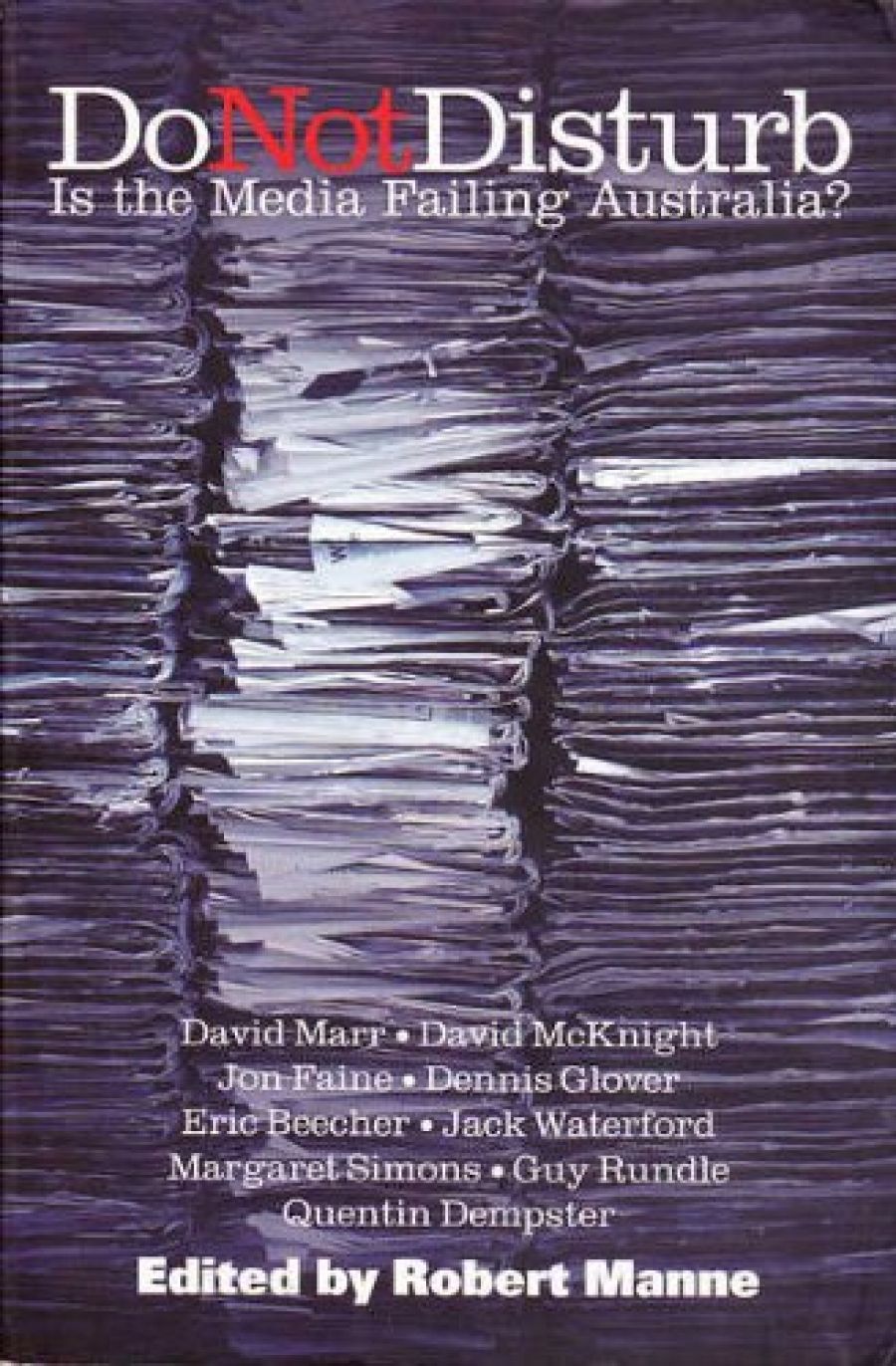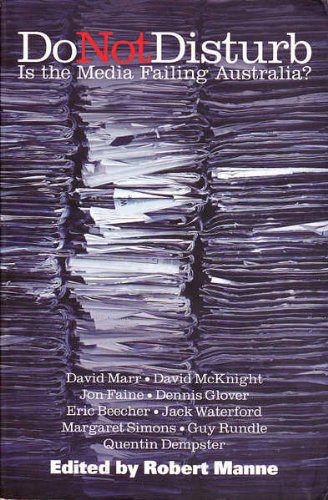
- Free Article: No
- Contents Category: Non-fiction
- Review Article: Yes
- Article Title: Not so random
- Online Only: No
- Custom Highlight Text:
Rupert Murdoch is the Napoleon of our times. He has gone on conquering largely because certain governments – Bob Hawke’s among them, in early 1987 – have persistently acquiesced, changing or moderating regulations as his battle plans required. It was once possible to view him as bound, in George Munster’s phrases, ‘on a random walk … [on which] despite the ever greater accumulation of means in his hands, he contributed more and more to the spreading confusion about ends’. That was written more than twenty years ago; Munster’s great book, A Paper Prince (1985), remains valid as a rigorous and witty account of Murdoch’s rise, and as an exemplary study of the relations of media, money and politics. But that walk is not so random now.
- Book 1 Title: Do Not Disturb
- Book 1 Subtitle: Is the media failing Australia?
- Book 1 Biblio: Black Inc., $29.95 pb, 232 pp
- Book 1 Cover Small (400 x 600):

For these chapters alone, Do Not Disturb would be worth your trouble; here principled cultural warriors are guided around the front line. For Manne, Murdoch’s dominance is the first of his three main reasons for ‘growing unease’ at the collusion by the media in an overall shift to the right, ‘a creeping conservative counter-revolution’. (Just when was that revolution, I have to ask, in the first place?) Manne points also to the government’s intimidation of the ABC and the stridency of the shock-jocks and the right-wing press commentariat. His contributors generally agree that Australia has become a harder society, unjust, dominantly materialist and empty-hearted. If this is true, how far can we blame the media? Or do they take their cues from their masters and their readers/consumers? Eric Beecher diagnoses the decline in serious journalism: ‘Blame the mood of the times, the ruthlessness of the business system, the transformation of journalism into entertainment, the fragmentation of media, the distractions that follow prosperity, the disaffection with politics and politicians, the obsession with celebrities.’ All this, he says, is ‘ultimately, the story of how not enough people care about ideas ahead of money’.
It is tempting to share his gloom; that’s what a lot of people say, particularly when surrounded by Sydney’s raging materialism. But Beecher talks as though there was only one-way traffic from society to media; as though the media themselves weren’t agenda-setters and educators, for better or worse. Guy Rundle makes the point differently:
As the global market continues to transform not only the breadth of the world, but also the character of personal relations and individual psychology, the public sphere … begins to be seriously undermined … to the degree that people now seem to be relatively uninterested in the integrity of government or the corruption of political processes.
The consequence is a market-born nihilism, a vacuum presently filled, as Rundle sees it, by ‘a fairytale social conservatism’ in which the economy is quarantined from the other parts of our lives. The processes make the media ‘cynical and monolithic’, ‘an agent of social control, rather than a forum for liberal and open discourse’. He appeals to all those who, while not identifying with the hard-line left, are still dismayed by the operation of a concentration-camp system for refugees, of going to war on the basis of plain lies, and the determined making-over of the country into the American model of working poverty and social coercion.
Quentin Dempster and Margaret Simons offer contrasting chapters on the ABC. Dempster, a courageous fighter over decades for his institution, argues cogently here for its advance into digital free-to-air multi-channelling, and condemns the drastic inroads into the funding of local drama. Simons guides an excursion round the ABC’s unhappiness. Her anecdotes are vivid and significant; but what’s new? Depression pervaded the broadcaster’s corridors just as palpably twenty years ago. Ken Inglis, the ABC’s principal historian, has argued that the Howard government’s attacks on the institution have been qualitatively different from those of every government before it (and no government likes independent critical enquiry). The present state of things needs more analysis. Some of that can be found in Martin Harrison’s incisive essay for Currency Press’ Platform Papers, Our ABC: A Dying Culture?, in which he identifies the ways in which the ABC is failing its charter, most of all in the stated obligation ‘to encourage and promote the musical, dramatic and other performing arts in Australia’.
To fulfil that duty adequately now, in the framework set by new media that adjoin traditional forms and also change them, a second television channel would be necessary: that, as Dempster argues, must involve the properly funded adoption of new technologies. With a hostile, grudging and suspicious government, always extending its tentacles into the ABC’s governing board, there’s little hope of such enterprise. Thus the national broadcaster, crucially positioned as it is, becomes a technological and cultural backwater. With all that said, salutes are due to the programme makers; Dempster, Robyn Williams, Kerry O’Brien, Kirsten Garrett, Liz Jackson, Stephen Crittenden and many more carry on with intrepid good humour, bloodied but unbowed, and Radio National remains the indispensable alternative press.
In other chapters, Dennis Glover blows apart the myth that the media are dominantly pro-Labor; and Jon Faine optimistically explores the democratic potential of talk-centred radio. Jack Waterford charts the temperate good manners of the press gallery through the federal election of 2004; while he may not have meant it quite this way, it seems to me that he’s really demonstrating their level of docility.
The final chapter, David Marr’s, is in many ways the strongest. Moving on from his and Marian Wilkinson’s work in Dark Victory, Marr demonstrates the frightening journalistic indifference to some of the worst cases among refugees and asylum seekers. Ahmed Ali Khateb, born in Kuwait to Palestinian parents, is a stateless failed asylum seeker. He remains in detention for no reason except that four out of seven of the High Court’s learned judges agreed with the government that he could be kept behind the wire indefinitely, as they did in the parallel case of the Iraqi Abbas Al Khafaji. From the momentary media fuss around them, does anyone remember their names? Only The Age, in Marr’s account, gave the court’s judgment front-page treatment, ‘although this was a story that concerned the fundamental liberties of us all’. He tells how Age journalist Andra Jackson managed to bring Cornelia Rau’s plight to properly headlined attention – but then Rau, after all, was ‘one of us’. He finds that, in this scarcely credible cruelty, we are all condemned; the media go to work with operative notions about what we’ll accept, while ‘[t]he High Court’s view that people we didn’t want could rot behind the wire licensed Australians to do what they want to do anyway: forget’.
Even if this is measurably the case (and given the volatility and fallibility of polling systems, it’s really unprovable), it is not written in stone. In a society more deeply and painfully conflicted than it has ever been, minds do actually change, editorial minds among them; and a progressive opposition party – if only we had one – would understand itself as a front-line educator, working with media to take us forward on human rights. This book, however, doesn’t allow for that kind of dynamism in concepts of population and audience.
There are big holes, too, in the canvas it presents. Apart from Dempster’s comments on the ABC’s drama production, there is no attention to the relations of art and journalism, as though works of the imagination were not themselves news. Far too many books go unreviewed, works of performance undiscussed, important cultural messages unanswered. It is odd too that Manne, editor of the invaluable Whitewash (2003), should have required no chapter on media treatments of race and ethnic relations. There’s nothing here by Aboriginal or any non-European Australians, and just one chapter by a woman.
I have pluralised the term ‘media’, as Manne and his contributors do not. The word is the plural form of medium, and this is more than a matter of grammar; as the book itself shows, the media do not for a moment constitute an undifferentiated block, and it is a great injustice to journalists to talk as though they do. It is the very diversity and conflict inside the media professions (plural again), and the permanent tensions among journalists, editors and managements, that yield the resources for change, the reasons not to despair.


Comments powered by CComment